 [While Bob & Cheryl Enyart go fishing we invite you to enjoy from the RSR archives our favorite List of Not So Old Things! Photos from today, June 25, 2021.]
[While Bob & Cheryl Enyart go fishing we invite you to enjoy from the RSR archives our favorite List of Not So Old Things! Photos from today, June 25, 2021.]
-- Finches Diversify in Decades, Opals Form in Months, Man's Genetic Diversity in 200 Generations, C-14 Everywhere: Real Science Radio hosts Bob Enyart and Fred Williams present their classic program that led to the audience-favorites rsr.org/list-shows! See below and hear on today's radio program our list of Not So Old and Not So Slow Things! From opals forming in months to man's genetic diversity in 200 generations, and with carbon 14 everywhere it's not supposed to be (including in diamonds and dinosaur bones!), scientific observations fill the guys' most traditional list challenging those who claim that the earth is billions of years old. Many of these scientific finds demand a re-evaluation of supposed million and billion-year ages.
 * Finches Adapt in 17 Years, Not 2.3 Million: Charles Darwin's finches are claimed to have taken 2,300,000 years to diversify from an initial species blown onto the Galapagos Islands. Yet individuals from a single finch species on a U.S. Bird Reservation in the Pacific were introduced to a group of small islands 300 miles away and in at most 17 years, like Darwin's finches, they had diversified their beaks, related muscles, and behavior to fill various ecological niches. Hear about this also at rsr.org/spetner.
* Finches Adapt in 17 Years, Not 2.3 Million: Charles Darwin's finches are claimed to have taken 2,300,000 years to diversify from an initial species blown onto the Galapagos Islands. Yet individuals from a single finch species on a U.S. Bird Reservation in the Pacific were introduced to a group of small islands 300 miles away and in at most 17 years, like Darwin's finches, they had diversified their beaks, related muscles, and behavior to fill various ecological niches. Hear about this also at rsr.org/spetner.
 * Opals Can Form in "A Few Months" And Don't Need 100,000 Years: A leading authority on opals, Allan W. Eckert, observed that, "scientific papers and textbooks have told that the process of opal formation requires tens of thousands of years, perhaps hundreds of thousands... Not true." A 2011 peer-reviewed paper in a geology journal from Australia, where almost all the world's opal is found, reported on the: "new timetable for opal formation involving weeks to a few months and not the hundreds of thousands of years envisaged by the conventional weathering model." (And apparently, per a 2019 report from Entomology Today, opals can even form around insects!) More knowledgeable scientists resist the uncritical, group-think insistence on false super-slow formation rates (as also for manganese nodules, gold veins, stone, petroleum, canyons and gullies, and even guts, all below). Regarding opals, Darwinian bias led geologists to long ignore possible quick action, as from microbes, as a possible explanation for these mineraloids. For both in nature and in the lab, opals form rapidly, not even in 10,000 years, but in weeks. See this also from creationists by a geologist, a paleobiochemist, and a nuclear chemist.
* Opals Can Form in "A Few Months" And Don't Need 100,000 Years: A leading authority on opals, Allan W. Eckert, observed that, "scientific papers and textbooks have told that the process of opal formation requires tens of thousands of years, perhaps hundreds of thousands... Not true." A 2011 peer-reviewed paper in a geology journal from Australia, where almost all the world's opal is found, reported on the: "new timetable for opal formation involving weeks to a few months and not the hundreds of thousands of years envisaged by the conventional weathering model." (And apparently, per a 2019 report from Entomology Today, opals can even form around insects!) More knowledgeable scientists resist the uncritical, group-think insistence on false super-slow formation rates (as also for manganese nodules, gold veins, stone, petroleum, canyons and gullies, and even guts, all below). Regarding opals, Darwinian bias led geologists to long ignore possible quick action, as from microbes, as a possible explanation for these mineraloids. For both in nature and in the lab, opals form rapidly, not even in 10,000 years, but in weeks. See this also from creationists by a geologist, a paleobiochemist, and a nuclear chemist.
* Finches Speciate in Two Generations vs Two Million Years for Darwin's Birds? Darwin's finches on the Galapagos Islands are said to have diversified into 14 species over a period of two million years. But in 2017 the journal Science reported a newcomer to the Island which within two generations spawned a reproductively isolated new species. In another instance as documented by Lee Spetner, a hundred birds of the same finch species introduced to an island cluster a 1,000 kilometers from Galapagos diversified into species with the typical variations in beak sizes, etc. "If this diversification occurred in less than seventeen years," Dr. Spetner asks, "why did Darwin’s Galapagos finches [as claimed by evolutionists] have to take two million years?"
 * Blue Eyes Originated Not So Long Ago: Not a million years ago, nor a hundred thousand years ago, but based on a peer-reviewed paper in Human Genetics, a press release at Science Daily reports that, "research shows that people with blue eyes have a single, common ancestor. A team at the University of Copenhagen have tracked down a genetic mutation which took place 6-10,000 years ago and is the cause of the eye colour of all blue-eyed humans alive on the planet today."
* Blue Eyes Originated Not So Long Ago: Not a million years ago, nor a hundred thousand years ago, but based on a peer-reviewed paper in Human Genetics, a press release at Science Daily reports that, "research shows that people with blue eyes have a single, common ancestor. A team at the University of Copenhagen have tracked down a genetic mutation which took place 6-10,000 years ago and is the cause of the eye colour of all blue-eyed humans alive on the planet today."
* Adding the Entire Universe to our List of Not So Old Things? Based on March 2019 findings from Hubble, Nobel laureate Adam Riess of the Space Telescope Science Institute and his co-authors in the Astrophysical Journal estimate that the universe is about a billion years younger than previously thought! Then in September 2019 in the journal Science, the age dropped precipitiously to as low as 11.4 billion years! Of course, these measurements also further squeeze the canonical story of the big bang chronology with its many already existing problems including the insufficient time to "evolve" distant mature galaxies, galaxy clusters, superclusters, enormous black holes, filaments, bubbles, walls, and other superstructures. So, even though the latest estimates are still absurdly too old (Google: big bang predictions, and click on the #1 ranked article, or just go on over there to rsr.org/bb), regardless, we thought we'd plop the whole universe down on our List of Not So Old Things!
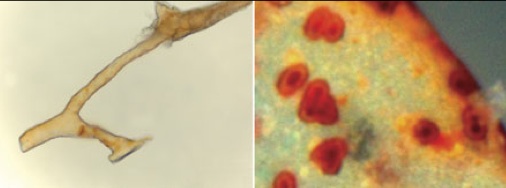 * After the Soft Tissue Discoveries, NOW Dino DNA: When a North Carolina State University paleontologist took the Tyrannosaurus Rex photos to the right of original biological material, that led to the 2016 discovery of dinosaur DNA, So far researchers have also recovered dinosaur blood vessels, collagen, osteocytes, hemoglobin, red blood cells, and various proteins.
* After the Soft Tissue Discoveries, NOW Dino DNA: When a North Carolina State University paleontologist took the Tyrannosaurus Rex photos to the right of original biological material, that led to the 2016 discovery of dinosaur DNA, So far researchers have also recovered dinosaur blood vessels, collagen, osteocytes, hemoglobin, red blood cells, and various proteins.
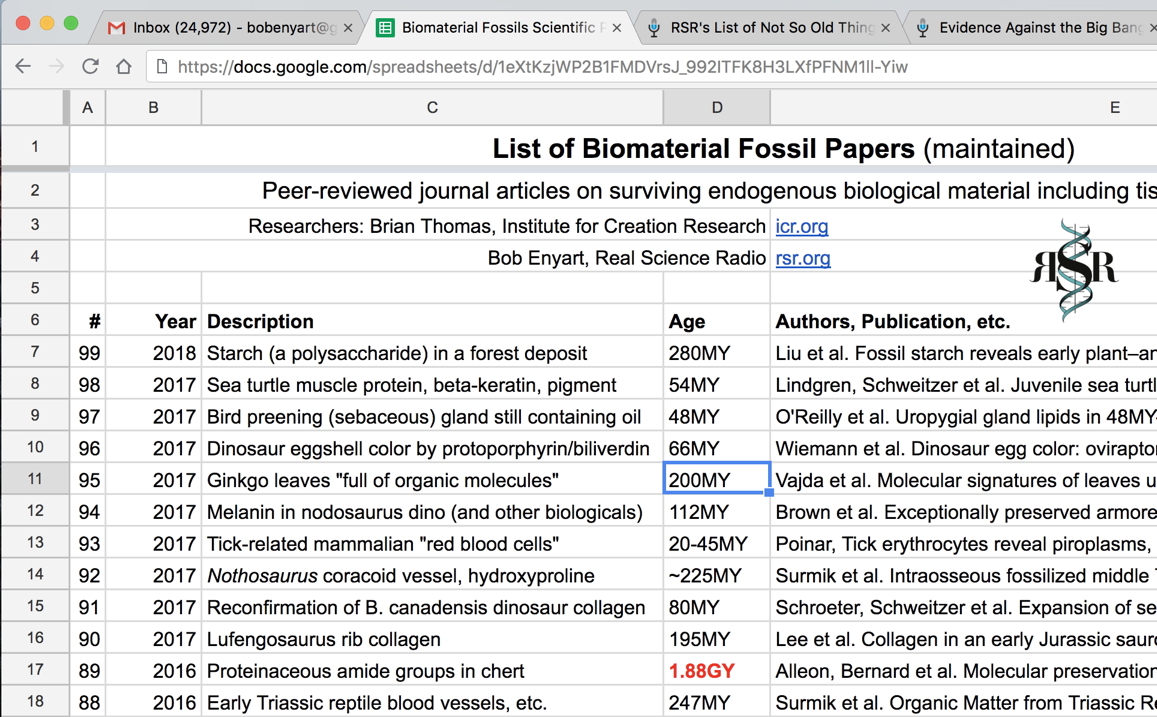 As of May 2018, twenty-six scientific journals, including Nature, Science, PNAS, PLoS One, Bone, and Journal of Vertebrate Paleontology, have confirmed the discovery of biomaterial fossils from many dinosaurs! Organisms including T. Rex, hadrosaur, titanosaur, triceratops, Lufengosaur, mosasaur, and Archaeopteryx, and many others dated, allegedly, even hundreds of millions of years old, have yielded their endogenous, still-soft biological material. See the web's most complete listing of 100+ journal papers (screenshot, left) announcing these discoveries at bflist.rsr.org and see it in layman's terms at rsr.org/soft.
As of May 2018, twenty-six scientific journals, including Nature, Science, PNAS, PLoS One, Bone, and Journal of Vertebrate Paleontology, have confirmed the discovery of biomaterial fossils from many dinosaurs! Organisms including T. Rex, hadrosaur, titanosaur, triceratops, Lufengosaur, mosasaur, and Archaeopteryx, and many others dated, allegedly, even hundreds of millions of years old, have yielded their endogenous, still-soft biological material. See the web's most complete listing of 100+ journal papers (screenshot, left) announcing these discoveries at bflist.rsr.org and see it in layman's terms at rsr.org/soft.
* Rapid Stalactites, Stalagmites, Etc.: A construction worker in 1954 left a lemonade bottle in one of Australia's famous Jenolan Caves. By 2011 it had been naturally transformed into a stalagmite (below, right). Increasing scientific knowledge is arguing for rapid cave formation (see below, Nat'l Park Service shrinks Carlsbad Caverns formation estimates from 260M years, to 10M, to 2M, to it "depends"). Likewise, examples are growing of rapid formations with typical chemical make-up (see bottle, left) of classic stalactites and stalagmites including: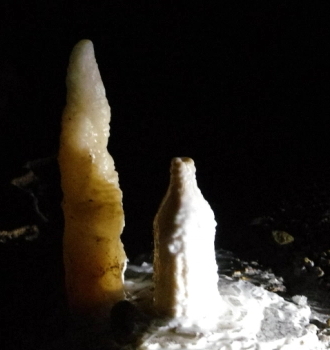 - in Nat'l Geo the Carlsbad Caverns stalagmite that rapidly covered a bat
- in Nat'l Geo the Carlsbad Caverns stalagmite that rapidly covered a bat
- the tunnel stalagmites at Tennessee's Raccoon Mountain
- hundreds of stalactites beneath the Lincoln Memorial
- those near Gladfelter Hall at Philadelphia's Temple University (send photos to Bob@rsr.org)
- hundreds of stalactites at Australia's zinc mine at Mt. Isa.
- and those beneath Melbourne's Shrine of Remembrance.
* Most Human Mutations Arose in 200 Generations: From Adam until Real Science Radio, in only 200 generations! The journal Nature reports The Recent Origin of Most Human Protein-coding Variants. As summarized by geneticist co-author Joshua Akey, "Most of the mutations that we found arose in the last 200 generations or so" (the same number previously published by biblical creationists). Another 2012 paper, in the American Journal of Physical Anthropology (Eugenie Scott's own field) on High mitochondrial mutation rates, shows that one mitochondrial DNA mutation occurs every other generation, which, as creationists point out, indicates that mtEve would have lived about 200 generations ago. That's not so old!
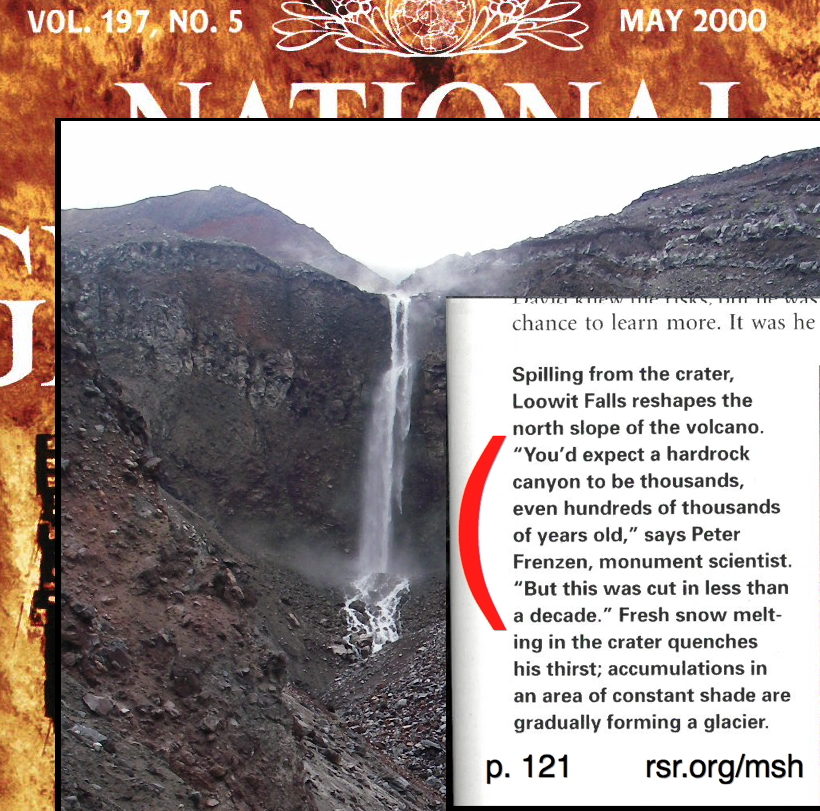 * National Geographic's Not-So-Old Hard-Rock Canyon at Mount St. Helens: As our List of Not So Old Things (this web page) reveals, by a kneejerk reaction evolutionary scientists assign ages of tens or hundreds of thousands of years (or at least just long enough to contradict Moses' chronology in Genesis.) However, with closer study, routinely, more and more old ages get revised downward to fit the world's growing scientific knowledge. So the trend is not that more information lengthens ages, but rather, as data replaces guesswork, ages tend to shrink until they are consistent with the young-earth biblical timeframe. Consistent with this observation, the May 2000 issue of National Geographic quotes the U.S. Forest Service's scientist at Mount St. Helens, Peter Frenzen, describing the canyon on the north side of the volcano. "You'd expect a hard-rock canyon to be thousands, even hundreds of thousands of years old. But this was cut in less than a decade." And as for the volcano itself, while again, the kneejerk reaction of old-earthers would be to claim that most geologic features are hundreds of thousands or millions of years old, the atheistic National Geographic magazine acknowledges from the evidence that Mount St. Helens, the volcanic mount, is only about 4,000 years old! See below and more at rsr.org/mount-st-helens.
* National Geographic's Not-So-Old Hard-Rock Canyon at Mount St. Helens: As our List of Not So Old Things (this web page) reveals, by a kneejerk reaction evolutionary scientists assign ages of tens or hundreds of thousands of years (or at least just long enough to contradict Moses' chronology in Genesis.) However, with closer study, routinely, more and more old ages get revised downward to fit the world's growing scientific knowledge. So the trend is not that more information lengthens ages, but rather, as data replaces guesswork, ages tend to shrink until they are consistent with the young-earth biblical timeframe. Consistent with this observation, the May 2000 issue of National Geographic quotes the U.S. Forest Service's scientist at Mount St. Helens, Peter Frenzen, describing the canyon on the north side of the volcano. "You'd expect a hard-rock canyon to be thousands, even hundreds of thousands of years old. But this was cut in less than a decade." And as for the volcano itself, while again, the kneejerk reaction of old-earthers would be to claim that most geologic features are hundreds of thousands or millions of years old, the atheistic National Geographic magazine acknowledges from the evidence that Mount St. Helens, the volcanic mount, is only about 4,000 years old! See below and more at rsr.org/mount-st-helens.
* Mount St. Helens Dome Ten Years Old not 1.7 Million: Geochron Laboratories of Cambridge, Mass., using potassium-argon and other radiometric techniques claims the rock sample they dated, from the volcano's dome, solidified somewhere between 340,000 and 2.8 million years ago. However photographic evidence and historical reports document the dome's formation during the 1980s, just ten years prior to the samples being collected. With the age of this rock known, radiometric dating therefore gets the age 99.99999% wrong.
 * Devils Hole Pupfish Isolated Not for 13,000 Years But for 100: Secular scientists default to knee-jerk, older-than-Bible-age dates. However, a tiny Mojave desert fish is having none of it. Rather than having been genetically isolated from other fish for 13,000 years (which would make this small school of fish older than the Earth itself), according to a paper in the journal Nature, actual measurements of mutation rates indicate that the genetic diversity of these Pupfish could have been generated in about 100 years, give or take a few.
* Devils Hole Pupfish Isolated Not for 13,000 Years But for 100: Secular scientists default to knee-jerk, older-than-Bible-age dates. However, a tiny Mojave desert fish is having none of it. Rather than having been genetically isolated from other fish for 13,000 years (which would make this small school of fish older than the Earth itself), according to a paper in the journal Nature, actual measurements of mutation rates indicate that the genetic diversity of these Pupfish could have been generated in about 100 years, give or take a few.
 * Polystrates like Spines and Rare Schools of Fossilized Jellyfish: Previously, seven sedimentary layers in Wisconsin had been described as taking a million years to form. And because jellyfish have no skeleton, as Charles Darwin pointed out, it is rare to find them among fossils. But now, reported in the journal Geology, a school of jellyfish fossils have been found throughout those same seven layers. So, polystrate fossils that condense the time of strata deposition from eons to hours or months, include:
* Polystrates like Spines and Rare Schools of Fossilized Jellyfish: Previously, seven sedimentary layers in Wisconsin had been described as taking a million years to form. And because jellyfish have no skeleton, as Charles Darwin pointed out, it is rare to find them among fossils. But now, reported in the journal Geology, a school of jellyfish fossils have been found throughout those same seven layers. So, polystrate fossils that condense the time of strata deposition from eons to hours or months, include:
- Jellyfish in central Wisconsin were not deposited and fossilized over a million years but during a single event quick enough to trap a whole school. (This fossil school, therefore, taken as a unit forms a polystrate fossil.) Examples are everywhere that falsify the claims of strata deposition over millions of years.
- Countless trilobites buried in astounding three dimensionality around the world are meticulously recovered from limestone, much of which is claimed to have been deposited very slowly. Contrariwise, because these specimens were buried rapidly in quickly laid down sediments, they show no evidence of greater erosion on their upper parts as compared to their lower parts. - The delicacy of radiating spine polystrates, like tadpole and jellyfish fossils, especially clearly demonstrate the rapidity of such strata deposition.
- The delicacy of radiating spine polystrates, like tadpole and jellyfish fossils, especially clearly demonstrate the rapidity of such strata deposition.
- A second school of jellyfish, even though they rarely fossilized, exists in another locale with jellyfish fossils in multiple layers, in Australia's Brockman Iron Formation, constraining there too the rate of strata deposition. By the way, jellyfish are an example of evolution's big squeeze. Like galaxies evolving too quickly, galaxy clusters, and even human feet (which, like Mummy DNA, challenge the Out of Africa paradigm), jellyfish have gotten into the act squeezing evolution's timeline, here by 200 million years when they were found in strata allegedly a half-a-billion years old. Other examples, ironically referred to as Medusoid Problematica, are even found in pre-Cambrian strata.
- 171 tadpoles of the same species buried in diatoms.
- Leaves buried vertically through single-celled diatoms powerfully refute the claimed super-slow deposition of diatomaceous rock.
- Many fossils, including a Mesosaur, have been buried in multiple "varve" layers, which are claimed to be annual depositions, yet they show no erosional patterns that would indicate gradual burial (as they claim, absurdly, over even thousands of years).
- A single whale skeleton preserved in California in dozens of layers of diatom deposits thus forming a polystrate fossil.
- 40 whales buried in the desert in Chile. "What's really interesting is that this didn't just happen once," said Smithsonian evolutionist Dr. Nick Pyenson. It happened four times." Why's that? Because "the fossil site has at least four layers", to which Real Science Radio's Bob Enyart replies: "Ha ha ha ha ha ha ha ha ha ha ha", with RSR co-host Fred Williams thoughtfully adding, "Ha ha!"
 * Polystrate Trees: Examples abound around the world of polystrate trees:
* Polystrate Trees: Examples abound around the world of polystrate trees:
- Yellowstone's petrified polystrate forest (with the NPS exhibit sign removed; see below) with successive layers of rootless trees demonstrating the rapid deposition of fifty layers of strata.
- A similarly formed polystrate fossil forest in France demonstrating the rapid deposition of a dozen strata.
- In a thousand locations including famously the Fossil Cliffs of Joggins, Nova Scotia, polystrate fossils such as trees span many strata.
- These trees lack erosion: Not only should such fossils, generally speaking, not even exist, but polystrates including trees typically show no evidence of erosion increasing with height. All of this powerfully disproves the claim that the layers were deposited slowly over thousands or millions of years. In the experience of your RSR radio hosts, evolutionists commonly respond to this hard evidence with mocking. See CRSQ June 2006, ICR Impact #316, and RSR 8-11-06 at KGOV.com.
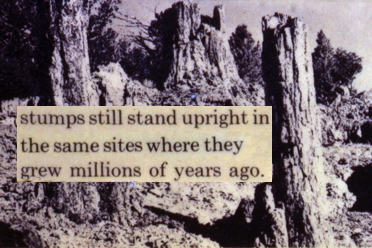 * Yellowstone Petrified Trees Sign Removed: The National Park Service removed their incorrect sign (see left and more). The NPS had claimed that in dozens of different strata over a 40-square mile area, many petrified trees were still standing where they had grown. The NPS eventually removed the sign partly because those petrified trees had no root systems, which they would have had if they had grown there. Instead, the trees of this "fossil forest" have roots that are abruptly broken off two or three feet from their trunks. If these mature trees actually had been remnants of sequential forests that had grown up in strata layer on top of strata layer, 27 times on Specimen Ridge (and 50 times at Specimen Creek), such a natural history implies passage of more time than permitted by biblical chronology. So, don't trust the National Park Service on historical science because they're wrong on the age of the Earth.
* Yellowstone Petrified Trees Sign Removed: The National Park Service removed their incorrect sign (see left and more). The NPS had claimed that in dozens of different strata over a 40-square mile area, many petrified trees were still standing where they had grown. The NPS eventually removed the sign partly because those petrified trees had no root systems, which they would have had if they had grown there. Instead, the trees of this "fossil forest" have roots that are abruptly broken off two or three feet from their trunks. If these mature trees actually had been remnants of sequential forests that had grown up in strata layer on top of strata layer, 27 times on Specimen Ridge (and 50 times at Specimen Creek), such a natural history implies passage of more time than permitted by biblical chronology. So, don't trust the National Park Service on historical science because they're wrong on the age of the Earth.
* Wood Petrifies Quickly: Not surprisingly, by the common evolutionary knee-jerk claim of deep time, "several researchers believe that several millions of years are necessary for the complete formation of silicified wood". Our List of Not So Old and Not So Slow Things includes the work of five Japanese scientists who proved creationist research and published their results in the peer-reviewed journal Sedimentary Geology showing that wood can and does petrify rapidly. Modern wood significantly petrified in 36 years these researchers concluded that wood buried in strata could have been petrified in "a fairly short period of time, in the order of several tens to hundreds of years."
 * The Scablands: The primary surface features of the Scablands, which cover thousands of square miles of eastern Washington, were long believed to have formed gradually. Yet, against the determined claims of uniformitarian geologists, there is now overwhelming evidence as presented even in a NOVA TV program that the primary features of the Scablands formed rapidly from a catastrophic breach of Lake Missoula causing a massive regional flood. Of course evolutionary geologists still argue that the landscape was formed over tens of thousands of years, now by claiming there must have been a hundred Missoula floods. However, the evidence that there was Only One Lake Missoula Flood has been powerfully reinforced by a University of Colorado Ph.D. thesis. So the Scablands itself is no longer available to old-earthers as de facto evidence for the passage of millions of years.
* The Scablands: The primary surface features of the Scablands, which cover thousands of square miles of eastern Washington, were long believed to have formed gradually. Yet, against the determined claims of uniformitarian geologists, there is now overwhelming evidence as presented even in a NOVA TV program that the primary features of the Scablands formed rapidly from a catastrophic breach of Lake Missoula causing a massive regional flood. Of course evolutionary geologists still argue that the landscape was formed over tens of thousands of years, now by claiming there must have been a hundred Missoula floods. However, the evidence that there was Only One Lake Missoula Flood has been powerfully reinforced by a University of Colorado Ph.D. thesis. So the Scablands itself is no longer available to old-earthers as de facto evidence for the passage of millions of years.
 * The Heart Mountain Detachment: in Wyoming just east of Yellowstone, this mountain did not break apart slowly by uniformitarian processes but in only about half-an-hour as widely reported including in the evolutionist LiveScience.com, "Land Speed Record: Mountain Moves 62 Miles in 30 Minutes." The evidence indicates that this mountain of rock covering 425 square miles rapidly broke into 50 pieces and slid apart over an area of more than 1,300 square miles in a biblical, not a "geological," timeframe.
* The Heart Mountain Detachment: in Wyoming just east of Yellowstone, this mountain did not break apart slowly by uniformitarian processes but in only about half-an-hour as widely reported including in the evolutionist LiveScience.com, "Land Speed Record: Mountain Moves 62 Miles in 30 Minutes." The evidence indicates that this mountain of rock covering 425 square miles rapidly broke into 50 pieces and slid apart over an area of more than 1,300 square miles in a biblical, not a "geological," timeframe.

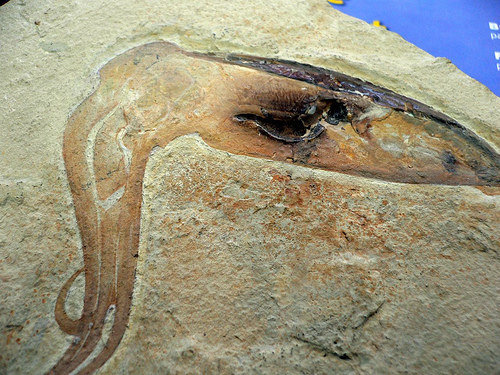 * "150 Million" year-old Squid Ink Not Decomposed: This still-writable ink had dehydrated but had not decomposed! The British Geological Survey's Dr. Phil Wilby, who excavated the fossil, said, "It is difficult to imagine how you can have something as soft and sloppy as an ink sac fossilised in three dimensions, still black, and inside a rock that is 150 million years old." And the Daily Mail states that, "the black ink was of exactly the same structure as that of today’s version", just desiccated. And Wilby added, "Normally you would find only the hard parts like the shell and bones fossilised but... these creatures... can be dissected as if they are living animals, you can see the muscle fibres and cells. It is difficult to imagine... The structure is similar to ink from a modern squid so we can write with it..." Why is this difficult for evolutionists to imagine? Because as Dr. Carl Wieland writes, "Chemical structures 'fall apart' all by themselves over time due to the randomizing effects of molecular motion."
* "150 Million" year-old Squid Ink Not Decomposed: This still-writable ink had dehydrated but had not decomposed! The British Geological Survey's Dr. Phil Wilby, who excavated the fossil, said, "It is difficult to imagine how you can have something as soft and sloppy as an ink sac fossilised in three dimensions, still black, and inside a rock that is 150 million years old." And the Daily Mail states that, "the black ink was of exactly the same structure as that of today’s version", just desiccated. And Wilby added, "Normally you would find only the hard parts like the shell and bones fossilised but... these creatures... can be dissected as if they are living animals, you can see the muscle fibres and cells. It is difficult to imagine... The structure is similar to ink from a modern squid so we can write with it..." Why is this difficult for evolutionists to imagine? Because as Dr. Carl Wieland writes, "Chemical structures 'fall apart' all by themselves over time due to the randomizing effects of molecular motion." Decades ago Bob Enyart broadcast a geology program about Mount St. Helens' catastrophic destruction of forests and the hydraulic transportation and upright deposition of trees. Later, Bob met the chief ranger from Haleakala National Park on Hawaii's island of Maui, Mark Tanaka-Sanders. The ranger agreed to correspond with his colleague at Yellowstone to urge him to have the sign removed. Thankfully, it was then removed. (See also AIG, CMI, and all the original Yellowstone exhibit photos.) Groundbreaking research conducted by creation geologist Dr. Steve Austin in Spirit Lake after Mount St. Helens eruption provided a modern-day analog to the formation of Yellowstone fossil forest. A steam blast from that volcano blew over tens of thousands of trees leaving them without attached roots. Many thousands of those trees were floating upright in Spirit Lake, and began sinking at varying rates into rapidly and sporadically deposited sediments. Once Yellowstone's successive forest interpretation was falsified (though like with junk DNA, it's too big to fail, so many atheists and others still cling to it), the erroneous sign was removed.
Decades ago Bob Enyart broadcast a geology program about Mount St. Helens' catastrophic destruction of forests and the hydraulic transportation and upright deposition of trees. Later, Bob met the chief ranger from Haleakala National Park on Hawaii's island of Maui, Mark Tanaka-Sanders. The ranger agreed to correspond with his colleague at Yellowstone to urge him to have the sign removed. Thankfully, it was then removed. (See also AIG, CMI, and all the original Yellowstone exhibit photos.) Groundbreaking research conducted by creation geologist Dr. Steve Austin in Spirit Lake after Mount St. Helens eruption provided a modern-day analog to the formation of Yellowstone fossil forest. A steam blast from that volcano blew over tens of thousands of trees leaving them without attached roots. Many thousands of those trees were floating upright in Spirit Lake, and began sinking at varying rates into rapidly and sporadically deposited sediments. Once Yellowstone's successive forest interpretation was falsified (though like with junk DNA, it's too big to fail, so many atheists and others still cling to it), the erroneous sign was removed.

 * Asiatic vs. European Honeybees: These two populations of bees have been separated supposedly for seven million years. A researcher decided to put the two together to see what would happen. What we should have here is a failure to communicate that would have resulted after their "language" evolved over millions of years. However, European and Asiatic honeybees are still able to communicate, putting into doubt the evolutionary claim that they were separated over "geologic periods." For more, see the Public Library of Science, Asiatic Honeybees Can Understand Dance Language of European Honeybees. (Oh yeah, and why don't fossils of poorly-formed honeycombs exist, from the millions of years before the bees and natural selection finally got the design right? Ha! Because they don't exist! :)
* Asiatic vs. European Honeybees: These two populations of bees have been separated supposedly for seven million years. A researcher decided to put the two together to see what would happen. What we should have here is a failure to communicate that would have resulted after their "language" evolved over millions of years. However, European and Asiatic honeybees are still able to communicate, putting into doubt the evolutionary claim that they were separated over "geologic periods." For more, see the Public Library of Science, Asiatic Honeybees Can Understand Dance Language of European Honeybees. (Oh yeah, and why don't fossils of poorly-formed honeycombs exist, from the millions of years before the bees and natural selection finally got the design right? Ha! Because they don't exist! :)
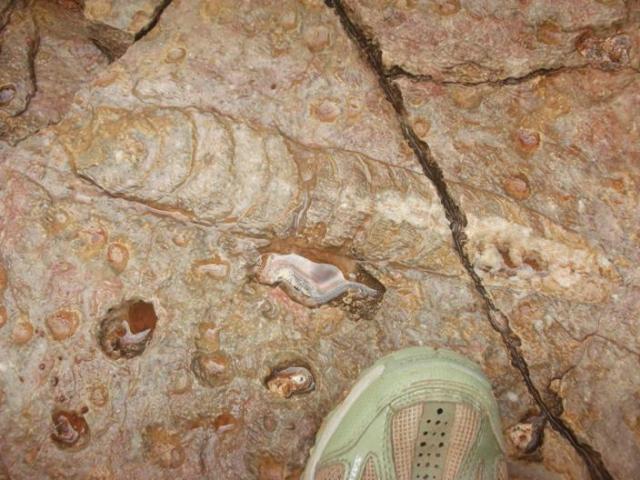
* Remember the Nautiloids: In the Grand Canyon there is a limestone layer averaging seven feet thick that runs the 277 miles of the canyon (and beyond) that covers hundreds of square miles and contains an average of one nautiloid fossil per square meter. Along with many other dead creatures in this one particular layer, 15% of these nautiloids were killed and then fossilized standing on their heads. Yes, vertically. They were caught in such an intense and rapid catastrophic flow that gravity was not able to cause all of their dead carcasses to fall over on their sides. Famed Mount St. Helens geologist Steve Austin is also the world's leading expert on nautiloid fossils and has worked in the canyon and presented his findings to the park's rangers at the invitation of National Park Service officials. Austin points out, as is true of many of the world's mass fossil graveyards, that this enormous nautiloid deposition provides indisputable proof of the extremely rapid formation of a significant layer of limestone near the bottom of the canyon, a layer like the others we've been told about, that allegedly formed at the bottom of a calm and placid sea with slow and gradual sedimentation. But a million nautiloids, standing on their heads, literally, would beg to differ. At our sister stie, RSR provides the relevant Geologic Society of America abstract, links, and video.
* Now It's Allegedly Two Million Year-Old Leaves: "When we started pulling leaves out of the soil, that was surreal, to know that it's millions of years old..." sur-re-al: adjective: a bizarre mix of fact and fantasy. In this case, the leaves are the facts. Earth scientists from Ohio State and the University of Minnesota say that wood and leaves they found in the Canadian Arctic are at least two million years old, and perhaps more than ten million years old, even though the leaves are just dry and crumbly and the wood still burns!
* Gold Precipitates in Veins in Less than a Second: After geologists submitted for decades to the assumption that each layer of gold would deposit at the alleged super slow rates of geologic process, the journal Nature Geoscience reports that each layer of deposition can occur within a few tenths of a second. Meanwhile, at the Lihir gold deposit in Papua New Guinea, evolutionists assumed the more than 20 million ounces of gold in the Lihir reserve took millions of years to deposit, but as reported in the journal Science, geologists can now demonstrate that the deposit could have formed in thousands of years, or far more quickly!

* Surtsey Island, Iceland: Of the volcanic island that formed in 1963, New Scientist reported in 2007 about Surtsey that "geographers... marvel that canyons, gullies and other land features that typically take tens of thousands or millions of years to form were created in less than a decade." Yes. And Sigurdur Thorarinsson, Iceland's chief geologist, wrote in the months after Surtsey formed, "that the time scale," he had been trained "to attach to geological developments is misleading."
[For what is said to] take thousands of years... the same development may take a few weeks or even days here [including to form] a landscape... so varied and mature that it was almost beyond belief... wide sandy beaches and precipitous crags... gravel banks and lagoons, impressive cliffs… hollows, glens and soft undulating land... fractures and faultscarps, channels and screes… confounded by what met your eye... boulders worn by the surf, some of which were almost round... -Iceland's chief geologist
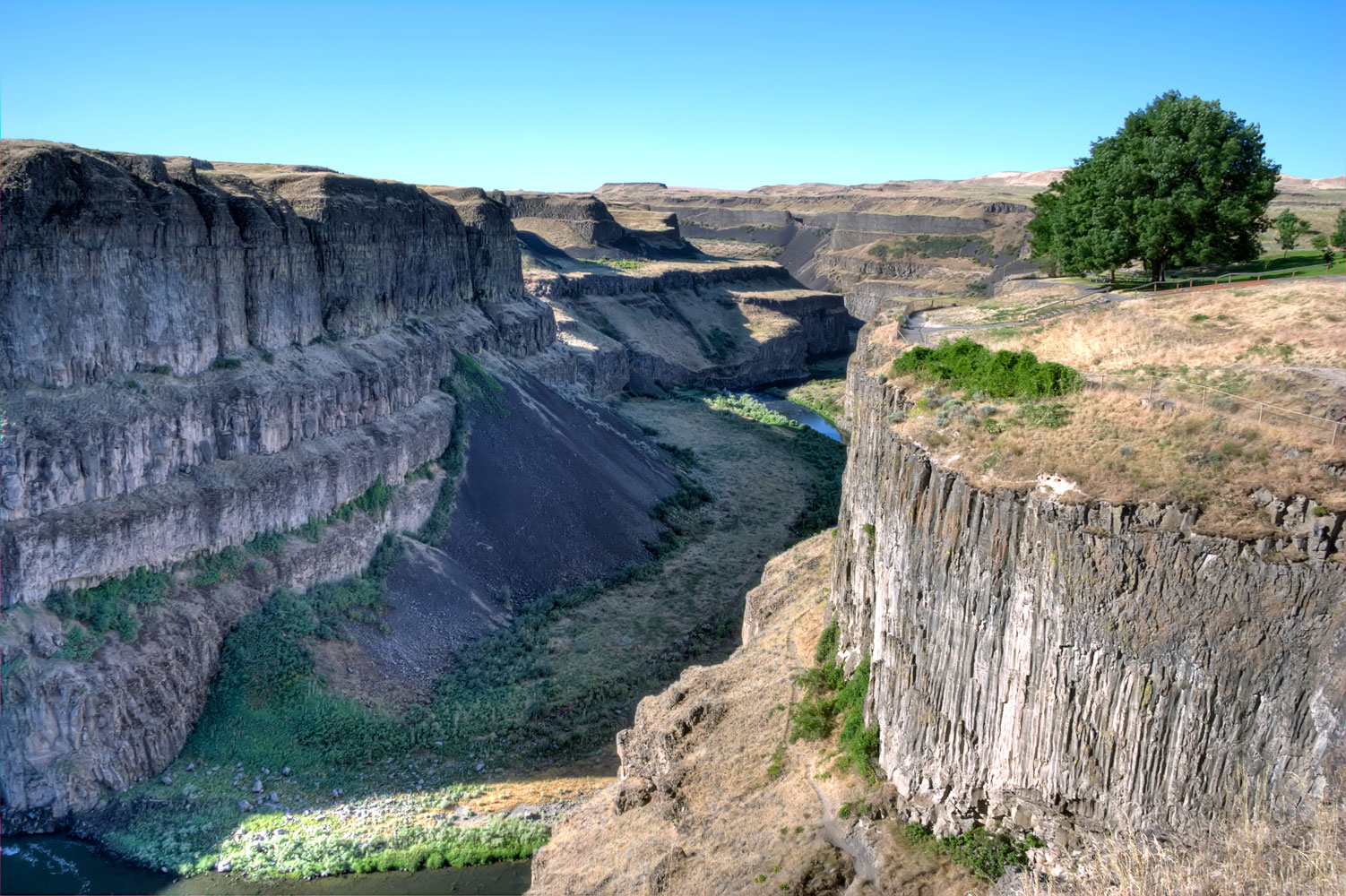 * The Palouse River Gorge: In the southeast of Washington State, the Palouse River Gorge is one of many features formed rapidly by 500 cubic miles of water catastrophically released with the breaching of a natural dam in the Lake Missoula Flood (which gouged out the Scablands as described above). So, hard rock can be breached and eroded rapidly.
* The Palouse River Gorge: In the southeast of Washington State, the Palouse River Gorge is one of many features formed rapidly by 500 cubic miles of water catastrophically released with the breaching of a natural dam in the Lake Missoula Flood (which gouged out the Scablands as described above). So, hard rock can be breached and eroded rapidly.
* Leaf Shapes Identical for 190 Million Years? From Berkley.edu, "Ginkgo biloba... dates back to... about 190 million years ago... fossilized leaf material from the Tertiary species Ginkgo adiantoides is considered similar or even identical to that produced by modern Ginkgo biloba trees... virtually indistinguishable..." The literature describes leaf shapes as "spectacularly diverse" sometimes within a species but especially across the plant kingdom. Because all kinds of plants survive with all kinds of different leaf shapes,  the conservation of a species retaining a single shape over alleged deep time is a telling issue. Darwin's theory is undermined by the unchanging shape over millions of years of a species' leaf shape. This lack of change, stasis in what should be an easily morphable plant trait, supports the broader conclusion that chimp-like creatures did not become human beings and all the other ambitious evolutionary creation of new kinds are simply imagined. (Ginkgo adiantoides and biloba are actually the same species. Wikipedia states, "It is doubtful whether the Northern Hemisphere fossil species of Ginkgo can be reliably distinguished." For oftentimes, as documented by Dr. Carl Werner in his Evolution: The Grand Experiment series, paleontogists falsely speciate identical specimens, giving different species names, even different genus names, to the fossil and living animals that appear identical.)
the conservation of a species retaining a single shape over alleged deep time is a telling issue. Darwin's theory is undermined by the unchanging shape over millions of years of a species' leaf shape. This lack of change, stasis in what should be an easily morphable plant trait, supports the broader conclusion that chimp-like creatures did not become human beings and all the other ambitious evolutionary creation of new kinds are simply imagined. (Ginkgo adiantoides and biloba are actually the same species. Wikipedia states, "It is doubtful whether the Northern Hemisphere fossil species of Ginkgo can be reliably distinguished." For oftentimes, as documented by Dr. Carl Werner in his Evolution: The Grand Experiment series, paleontogists falsely speciate identical specimens, giving different species names, even different genus names, to the fossil and living animals that appear identical.)
* Box Canyon, Idaho: Geologists now think Box Canyon in Idaho, USA, was carved by a catastrophic flood and not slowly over millions of years with 1) huge plunge pools formed by waterfalls; 2) the almost complete removal of large basalt boulders from the canyon; 3) an eroded notch on the plateau at the top of the canyon; and 4) water scour marks on the basalt plateau leading to the canyon. Scientists calculate that the flood was so large that it could have eroded the whole canyon in as little as 35 days. See the journal Science, Formation of Box Canyon, Idaho, by Megaflood, and the Journal of Creation, and Creation Magazine.
 * Manganese Nodules Rapid Formation: Allegedly, as claimed at the Wikipedia entry from 2005 through 2021: "Nodule growth is one of the slowest of all geological phenomena – in the order of a centimeter over several million years." Wow, that would be slow! And a Texas A&M Marine Sciences technical slide presentation says, “They grow very slowly (mm/million years) and can be tens of millions of years old", with RWU's oceanography textbook also putting it at "0.001 mm per thousand years." But according to a World Almanac documentary they have formed "around beer cans," said marine geologist Dr. John Yates in the 1997 video Universe Beneath the Sea: The Next Frontier. There are also reports of manganese nodules forming around ships sunk in the First World War. See more at at youngearth.com, at TOL, in the print edition of the Journal of Creation, and in this typical forum discussion with atheists (at the Chicago Cubs forum no less :).
* Manganese Nodules Rapid Formation: Allegedly, as claimed at the Wikipedia entry from 2005 through 2021: "Nodule growth is one of the slowest of all geological phenomena – in the order of a centimeter over several million years." Wow, that would be slow! And a Texas A&M Marine Sciences technical slide presentation says, “They grow very slowly (mm/million years) and can be tens of millions of years old", with RWU's oceanography textbook also putting it at "0.001 mm per thousand years." But according to a World Almanac documentary they have formed "around beer cans," said marine geologist Dr. John Yates in the 1997 video Universe Beneath the Sea: The Next Frontier. There are also reports of manganese nodules forming around ships sunk in the First World War. See more at at youngearth.com, at TOL, in the print edition of the Journal of Creation, and in this typical forum discussion with atheists (at the Chicago Cubs forum no less :).

* "6,000 year-old" Mitochondrial Eve: As the Bible calls "Eve... the mother of all living" (Gen. 3:20), genetic researchers have named the one woman from whom all humans have descended "Mitochondrial Eve." But in a scientific attempt to date her existence, they openly admit that they included chimpanzee DNA in their analysis in order to get what they viewed as a reasonably old date of 200,000 years ago (which is still surprisingly recent from their perspective, but old enough not to strain Darwinian theory too much). But then as widely reported including by Science magazine, when they dropped the chimp data and used only actual human mutation rates, that process determined that Eve lived only six thousand years ago! In Ann Gibbon's Science article, "Calibrating the Mitochondrial Clock," rather than again using circular reasoning by assuming their conclusion (that humans evolved from ape-like creatures), they performed their calculations using actual measured mutation rates. This peer-reviewed journal then reported that if these rates have been constant, "mitochondrial Eve… would be a mere 6000 years old." See also the journal Nature and creation.com's "A shrinking date for Eve," and Walt Brown's assessment. Expectedly though, evolutionists have found a way to reject their own unbiased finding (the conclusion contrary to their self-interest) by returning to their original method of using circular reasoning, as reported in the American Journal of Human Genetics, "calibrating against recent evidence for the divergence time of humans and chimpanzees," to reset their mitochondrial clock back to 200,000 years.
 * Even Younger Y-Chromosomal Adam: (Although he should be called, "Y-Chromosomal Noah.") While we inherit our mtDNA only from our mothers, only men have a Y chromosome (which incidentally genetically disproves the claim that the fetus is "part of the woman's body," since the little boy's y chromosome could never be part of mom's body). Based on documented mutation rates on and the extraordinary lack of mutational differences in this specifically male DNA, the Y-chromosomal Adam would have lived only a few thousand years ago! (He's significantly younger than mtEve because of the genetic bottleneck of the global flood.) Yet while the Darwinian camp wrongly claimed for decades that humans were 98% genetically similar to chimps, secular scientists today, using the same type of calculation only more accurately, have unintentionally documented that chimps are about as far genetically from what makes a human being a male, as mankind itself is from sponges! Geneticists have found now that sponges are 70% the same as humans genetically, and separately, that human and chimp Y chromosomes are "horrendously" 30% different. (See also Why Was Canaan Cursed?)
* Even Younger Y-Chromosomal Adam: (Although he should be called, "Y-Chromosomal Noah.") While we inherit our mtDNA only from our mothers, only men have a Y chromosome (which incidentally genetically disproves the claim that the fetus is "part of the woman's body," since the little boy's y chromosome could never be part of mom's body). Based on documented mutation rates on and the extraordinary lack of mutational differences in this specifically male DNA, the Y-chromosomal Adam would have lived only a few thousand years ago! (He's significantly younger than mtEve because of the genetic bottleneck of the global flood.) Yet while the Darwinian camp wrongly claimed for decades that humans were 98% genetically similar to chimps, secular scientists today, using the same type of calculation only more accurately, have unintentionally documented that chimps are about as far genetically from what makes a human being a male, as mankind itself is from sponges! Geneticists have found now that sponges are 70% the same as humans genetically, and separately, that human and chimp Y chromosomes are "horrendously" 30% different. (See also Why Was Canaan Cursed?)
* Genome "History" Contradicts Alleged Tree of Life: RSR loves to report on the Genomes that Just Don't Fit [the Darwinian tree of life] as reported in the work of scientists who are sequencing the entire genomes of more and more species. For not only do Mitochondrial Eve and Y-Chromosomal Adam provide strong evidence for biblical creationism, but so does the chimpanzee Y chromosome and the genomes of kangaroos, worms, and sponges which are 70% human :)
 * Spiral Galaxies: after their alleged billions of years the spiral arms of “pinwheel” galaxies should now be deformed, since as has been known for decades, the speed of the arms does not align with the galaxy centers, so there is “missing billions of years” of deformation in spiral galaxies. Atheistic astronomers have great difficulty even explaining where our own Moon came from, let alone our entire solar system and the entire universe. And just like Darwin's "Origin of Species" begins with species, the standard models of star formation begin with the explosion of preexisting stars or with star formation already underway. Astrophysicists even admit they can’t figure out which formed first, stars or galaxies, showing that their Big Bang hypothesis does not merit the absolute trust that millions put in it. Thus far from being able to explain how the universe could form apart from God, they are groping in the dark. See RSR 7-25-08 at KGOV.
* Spiral Galaxies: after their alleged billions of years the spiral arms of “pinwheel” galaxies should now be deformed, since as has been known for decades, the speed of the arms does not align with the galaxy centers, so there is “missing billions of years” of deformation in spiral galaxies. Atheistic astronomers have great difficulty even explaining where our own Moon came from, let alone our entire solar system and the entire universe. And just like Darwin's "Origin of Species" begins with species, the standard models of star formation begin with the explosion of preexisting stars or with star formation already underway. Astrophysicists even admit they can’t figure out which formed first, stars or galaxies, showing that their Big Bang hypothesis does not merit the absolute trust that millions put in it. Thus far from being able to explain how the universe could form apart from God, they are groping in the dark. See RSR 7-25-08 at KGOV.
* Transient Solar System Events: The many unexpected transient elements in our solar system including changes on the Moon's surface, changes in Saturn's rings (see below), and the lifespan of our short-period comets which last only thousands, and not millions, of years because of the significant percent of their mass burning off each time their orbit approaches perihelion, when they are nearest to the Sun.
* Transient Galactic Events: There are also transient galactic elements such as the extreme variability from 1987 till 1991 in one of the brightest objects in the gamma-ray sky, quasar 3C 279, which then faded from gamma-ray view!
 * Supernova Remnants: an explosion appeared in the night sky in 1054 A.D. as a supernova remnant (SNR) forming the Crab Nebula. Evolutionary scientists have measured and calculated the expected rate that stars would explode. However, if the universe is billions of years old, the vast majority of SNRs (like the Crab Nebula) that should exist, are missing! Instead, the number of SNRs corresponds well to the expected number if the universe is less than 10,000 years old, especially considering that astronomers have not found a single SNR at Stage 3 (a great diameter)! Of course, the lack of Stage 3 SNRs is consistent with the young universe. Listen to this Real Science Radio program at KGOV.com!
* Supernova Remnants: an explosion appeared in the night sky in 1054 A.D. as a supernova remnant (SNR) forming the Crab Nebula. Evolutionary scientists have measured and calculated the expected rate that stars would explode. However, if the universe is billions of years old, the vast majority of SNRs (like the Crab Nebula) that should exist, are missing! Instead, the number of SNRs corresponds well to the expected number if the universe is less than 10,000 years old, especially considering that astronomers have not found a single SNR at Stage 3 (a great diameter)! Of course, the lack of Stage 3 SNRs is consistent with the young universe. Listen to this Real Science Radio program at KGOV.com! * The Missing Big Bang Shadow: The missing "shadow" of the Big Bang from behind nearby galaxies is a prediction of biblical creationism. Yet the Astrophysical Journal reported that no shadow was detected after averaging measurements from NASA data for 31 galaxy clusters. As a Huntsville, Alabama scientist Dr. Richard Lieu stated, "Either... the Big Bang is blown away or ... there is something else going on'." Other evidence consistent with a not-so-old universe includes connected galaxies, galaxy clusters, the missing gas and dust of intracluster medium (ICM) in globular clusters of hundreds of thousands of stars purportedly emitting matter from solar winds for billions of years, and nearby blue stars!
* The Missing Big Bang Shadow: The missing "shadow" of the Big Bang from behind nearby galaxies is a prediction of biblical creationism. Yet the Astrophysical Journal reported that no shadow was detected after averaging measurements from NASA data for 31 galaxy clusters. As a Huntsville, Alabama scientist Dr. Richard Lieu stated, "Either... the Big Bang is blown away or ... there is something else going on'." Other evidence consistent with a not-so-old universe includes connected galaxies, galaxy clusters, the missing gas and dust of intracluster medium (ICM) in globular clusters of hundreds of thousands of stars purportedly emitting matter from solar winds for billions of years, and nearby blue stars!
* Saturn’s Rings: Not evincing the stability suggested by their presumed 50 to 100 million year-old age, instead of showing their predicted stability, Saturn's rings have changed significantly since man’s first mappings, including the startling (to evolutionists) rapid approach of the inner-most ring toward the planet. See RSR 4-10-06 at KGOV.
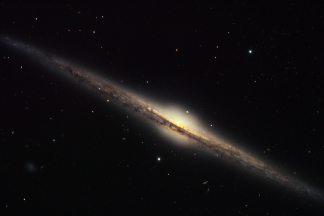 * "Surprisingly Orderly" Star Clusters in Spiral Galaxies: The Big Bang model predicted that the bulge of stars in the center of spiral galaxies resulted from millions of years of collisions. But about the perfect orderliness of those stars, as reported in the New Scientist article, Galaxies too good to be true, Princeton University cosmologist Jim Peebles admitted that, "It's really an embarrassment." And cosmologist John Kormendy says that the pristine bulges "were something of a shock" and "look rather too perfect." To which RSR says :) and about which Spike Psarris created the greatest astronomy DVDs ever made, and thanks to Creation magazine for alerting RSR to this! Those who believe in naturalist origins are forever dismayed, shocked, and even call the latest discoveries "horrendous" because scientific observations typically contradict the fundamental predictions of atheistic origins. (One small example: Most animals reproduce sexually, yet Darwinism would never predict sexual reproduction.)
* "Surprisingly Orderly" Star Clusters in Spiral Galaxies: The Big Bang model predicted that the bulge of stars in the center of spiral galaxies resulted from millions of years of collisions. But about the perfect orderliness of those stars, as reported in the New Scientist article, Galaxies too good to be true, Princeton University cosmologist Jim Peebles admitted that, "It's really an embarrassment." And cosmologist John Kormendy says that the pristine bulges "were something of a shock" and "look rather too perfect." To which RSR says :) and about which Spike Psarris created the greatest astronomy DVDs ever made, and thanks to Creation magazine for alerting RSR to this! Those who believe in naturalist origins are forever dismayed, shocked, and even call the latest discoveries "horrendous" because scientific observations typically contradict the fundamental predictions of atheistic origins. (One small example: Most animals reproduce sexually, yet Darwinism would never predict sexual reproduction.)
 * 9 Billion Years of Missing Metal in Spiral Galaxies: Some people don't like heavy metal, but who would have chucked nine billion years worth? Fifteen entire galaxies studied contradict the standard model of star and galaxy formation which claims that as billions of years pass during star evolution, they're supposed to create way more heavier metals than these trillion or so stars possess. See this at Space.com.
* 9 Billion Years of Missing Metal in Spiral Galaxies: Some people don't like heavy metal, but who would have chucked nine billion years worth? Fifteen entire galaxies studied contradict the standard model of star and galaxy formation which claims that as billions of years pass during star evolution, they're supposed to create way more heavier metals than these trillion or so stars possess. See this at Space.com.
* Earth's Magnetic Field Rapid Decay: As summarized by University of Maryland geophysicist Daniel Lathrop, “In particular, over the last 150 years or so, the Earth’s magnetic field has declined in strength about ten percent, and continues to decline in strength [as is evident] every time people go and make new measurements.” Creationists point out that this rapid decay is not expected in such a brief snapshot in time if our planet were 4.6 billion years old. On the other hand, these careful, long-term, and worldwide measurements that document the rapidly decreasing strength of Earth's magnetic field are consistent with a young Earth. Lathrop, not surprisingly, is an old-earth geophysicist who nonetheless acknowledged this data. Creationist physicist Russell Humphreys of Sandia National Labs has updated his previous work by publishing Earth's Magnetic Field Is Decaying Steadily, which includes global data through 2010. Humphreys observes that, "in 1968 the International Association of Geomagnetism and Aeronomy (IAGA) began more systematically measuring, gathering, and analyzing geomagnetic data from all over the world. ... Every five years starting in 1970, they have published both dipole and non-dipole components of the field. Using older data, the IAGA also extended the model..." backward in time. See more at our RSR site, youngearth.com/magnetic-field.
* Earth's Rapid Magnetic Reversals: Do not confuse the field's decay with its reversals. Dr. Walt Brown, with a Ph.D. in electrical engineering from MIT, lists here and here the published research opposing any notion that magnetic "reversals" must occur over long periods. For example:
- Evidence Suggesting Extremely Rapid Field Variations During a Geomagnetic Reversal, Earth and Planetary Science Letters, 1989.
- Earth's Field Flipping [i.e., decaying] Fast, New Scientist, 1992.
- New Evidence for Extraordinarily Rapid Change of the Geomagnetic Field During a Reversal, Nature 1995.
In his book In the Beginning, Dr. Brown points out that, "At one time the orientation of the earth's magnetic field changed rapidly by up to 6 degrees per day for several days." Update: In 2014, an old-earth scientist disclaimed his own research, retracting his support for rapid reversals based, not on the large reliable magnetic grains that are difficult to reorient, but on the smaller, less reliable grains which move far more easily. Click for the references and for Dr. Russell Humphrey's answer to the question: Why has one author retracted? And consider also kgov.com/magnetic-fields.
* South Atlantic Anomaly: The SAA hole in Earth's protective magnetic field is so severe that when passing through the Hubble takes no photographs. The evidence points to this phenomenon resulting from "something unusual about the core-mantle boundary under Africa." That part of the Earth though is allegedly over four billion years old. Especially knowing that 90% of Earth's radioactivity exists in the continental crust (and preferentially near granite), the inner Earth should have reached equilibrium billions of years ago. So if this anomaly exists at the core-mantle boundary that's evidence that the entire inner earth belongs on this List of Not So Old Things.
* Fossil "Reefs": As we report in our Real Science Radio program on modern reefs and alleged fossil "reefs" (rsr.org/reefs), PhD geologist Andrew Snelling did a great job presenting the widespread secular, peer-reviewed journal conclusions that fossil reefs are not reefs at all, that they lack the reef framework of layers upon layers of skeletons, and that they cannot be explained by comparison to modern reefs. Rather, "fossil reefs" are typically jumbled and broken flood deposits which often lack widespread remains of the very creatures that form reefs. Likewise Dr. Tas Walker undermined the old-earth argument for paleosols (alleged ancient soil horizons which are actually pseudosols), which typically lack multiple diagnostic features including lacking evidence of roots, lacking expected layer horizons, and where relevant, lack the burned organic matter that would have been expected from overlying lava flows). And Dr. John Woodmorappe likewise undermined the old-earth argument regarding alleged paleokarsts (geologic column strata supposedly shaped by long exposure to surface erosion, a.k.a. pseudokarsts).
 * Carbon-14 Found Everywhere It's Not Supposed To Be: Carbon-14 C14 decays in only thousands of years and therefore cannot last for millions. Thus evolutionists did not expect to find C-14 EVERYWHERE it shouldn't be if the earth were old. Carbon-14 is found in a mosasaur bone, dinosaur fossils, marble, fossilized wood, natural gas, coal, oil and other petroleum products, geological graphite, and Mesozoic-layer limestone, deep ground water, and even in supposedly billion-year-old diamonds! A secondary assumption by old-earth scientists proposes that the C-14 in diamonds (coal, etc.) must have come from C-13 and neutron capture. However, first, radio activity is concentrated in continental rock (see RSR Prediction below), and secondly, relatively speaking, radioactivity is relatively scare even in the continental crust, at least as documented by this U.S.G.S. report for enormous swatches of land. Thirdly, a geologist with a degree from Colorado's School of Mines who has a background in nuclear physics (who also spent years bombarding various elements with neutrons to make isotopes for industry), explained to RSR that Carbon does not easily absorb neutrons because it is the heavier elements beginning with Sodium that readily capture neutrons. Further, while it is possible but extremely unlikely that a Carbon atom will capture a free neutron, industrial processes use Carbon to slow down neutrons, whereas they use heavier elements, typically starting with Silicon, which is almost double the atomic weight of Carbon, for neutron capture. Consider also, as Dr. Paul Giem writes, that "since nitrogen-14 captures neutrons 110,000 times more easily than does carbon-13," samples with even tiny amounts of nitrogen would dramatically increase carbon dates, such that, "If neutron capture is a significant source of carbon-14 in a given sample, radiocarbon dates should vary wildly with the nitrogen content of the sample." Giem adds, "I know of no such data." And recognizing that U.S.G.S report of scarce crustal radioactivity for coal, basalt, shales, granite, fly ash, etc., Dr. Jonathan Sarfati builds upon Dr. Giem's research arguing that neutron capture could account for less than one 10,000th of the C-14 in diamonds (see these peer-reviewed calculations). See more at rsr.org/Carbon-14.
* Carbon-14 Found Everywhere It's Not Supposed To Be: Carbon-14 C14 decays in only thousands of years and therefore cannot last for millions. Thus evolutionists did not expect to find C-14 EVERYWHERE it shouldn't be if the earth were old. Carbon-14 is found in a mosasaur bone, dinosaur fossils, marble, fossilized wood, natural gas, coal, oil and other petroleum products, geological graphite, and Mesozoic-layer limestone, deep ground water, and even in supposedly billion-year-old diamonds! A secondary assumption by old-earth scientists proposes that the C-14 in diamonds (coal, etc.) must have come from C-13 and neutron capture. However, first, radio activity is concentrated in continental rock (see RSR Prediction below), and secondly, relatively speaking, radioactivity is relatively scare even in the continental crust, at least as documented by this U.S.G.S. report for enormous swatches of land. Thirdly, a geologist with a degree from Colorado's School of Mines who has a background in nuclear physics (who also spent years bombarding various elements with neutrons to make isotopes for industry), explained to RSR that Carbon does not easily absorb neutrons because it is the heavier elements beginning with Sodium that readily capture neutrons. Further, while it is possible but extremely unlikely that a Carbon atom will capture a free neutron, industrial processes use Carbon to slow down neutrons, whereas they use heavier elements, typically starting with Silicon, which is almost double the atomic weight of Carbon, for neutron capture. Consider also, as Dr. Paul Giem writes, that "since nitrogen-14 captures neutrons 110,000 times more easily than does carbon-13," samples with even tiny amounts of nitrogen would dramatically increase carbon dates, such that, "If neutron capture is a significant source of carbon-14 in a given sample, radiocarbon dates should vary wildly with the nitrogen content of the sample." Giem adds, "I know of no such data." And recognizing that U.S.G.S report of scarce crustal radioactivity for coal, basalt, shales, granite, fly ash, etc., Dr. Jonathan Sarfati builds upon Dr. Giem's research arguing that neutron capture could account for less than one 10,000th of the C-14 in diamonds (see these peer-reviewed calculations). See more at rsr.org/Carbon-14.
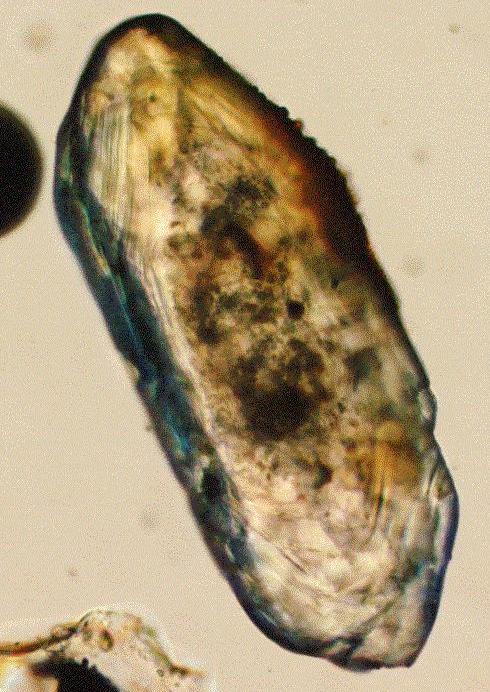 * Helium Found Everywhere It's Not Supposed to Be: By radiometric dating and the evolutionary time frame, zircon crystals should be 4.0 to 4.4 billion years old, yet that contradicts the claim that our allegedly 4.5-billion year old earth was supposedly molten until 3.9 billion years ago. Further, these zircons, twice the width of a human hair, are loaded with helium, "an almost phenomenal amount", which should not remain therein if these were millions, let alone billions of years old! The periodic table shows helium to be an ultralight element. As even birthday balloons suggest, because its atom is so tiny helium easily escapes from virtually any enclosures, especially natural ones, including from crystals! The crystal lattice is large compared to the size of the tiny helium atom and any movement from natural molecular vibrations, especially as increased by temperature variations, will result in helium escaping any confinement. Empirical laboratory experiments confirm this obvious physical reality. Continental crust contains uranium, and uranium has a super slow half-life and its decay chain produces helium. The above facts enable us to test a huge assumption made by old-earth geologists, namely, That zircons, which also contain radioactive uranium, are a billion years old. :) If
* Helium Found Everywhere It's Not Supposed to Be: By radiometric dating and the evolutionary time frame, zircon crystals should be 4.0 to 4.4 billion years old, yet that contradicts the claim that our allegedly 4.5-billion year old earth was supposedly molten until 3.9 billion years ago. Further, these zircons, twice the width of a human hair, are loaded with helium, "an almost phenomenal amount", which should not remain therein if these were millions, let alone billions of years old! The periodic table shows helium to be an ultralight element. As even birthday balloons suggest, because its atom is so tiny helium easily escapes from virtually any enclosures, especially natural ones, including from crystals! The crystal lattice is large compared to the size of the tiny helium atom and any movement from natural molecular vibrations, especially as increased by temperature variations, will result in helium escaping any confinement. Empirical laboratory experiments confirm this obvious physical reality. Continental crust contains uranium, and uranium has a super slow half-life and its decay chain produces helium. The above facts enable us to test a huge assumption made by old-earth geologists, namely, That zircons, which also contain radioactive uranium, are a billion years old. :) If 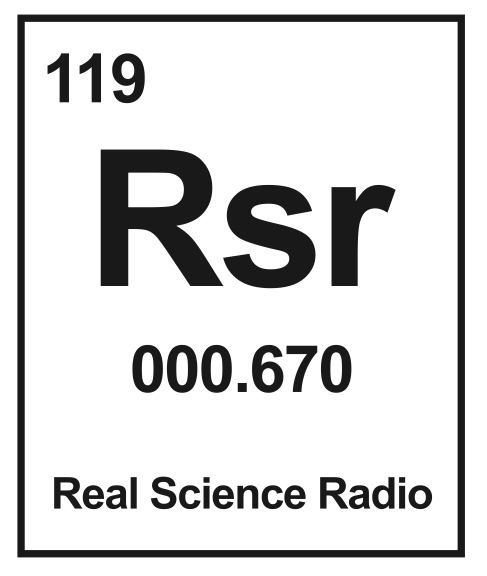 zircons were that old, and if uranium always decayed slowly over hundreds of millions of years, then zircons should have almost no helium in them because it would have diffused out relatively quickly. However, a Ph.D. geophysicist from Los Alamos Nat'l Labs and other physicists and scientists published a prediction of the rate of helium diffusion from zircons at various temperatures. A high-precision laboratory then measured actual diffusion rates which dramatically matched their predictions, which were based on a 6,000 year age of the zircons. Meanwhile, a prediction based on billion-year ages would be off by a factor of about 10,000. more...
zircons were that old, and if uranium always decayed slowly over hundreds of millions of years, then zircons should have almost no helium in them because it would have diffused out relatively quickly. However, a Ph.D. geophysicist from Los Alamos Nat'l Labs and other physicists and scientists published a prediction of the rate of helium diffusion from zircons at various temperatures. A high-precision laboratory then measured actual diffusion rates which dramatically matched their predictions, which were based on a 6,000 year age of the zircons. Meanwhile, a prediction based on billion-year ages would be off by a factor of about 10,000. more...
FAST ROCK, PETROLEUM, FOSSILS, & MUD: See the following...
* Wet Sand Hardens into Stone in Hours: Rather than taking geologic ages to lithify, here are three methods of rapidly turning sediments rock hard:
- water and common soil bacteria, in a couple hours, turn "soft sand" into "something resembling marble more than sandstone", according to scientists at Murdoch University who have gone from lab experiments to the marketplace where they spray bacteria-laden water onto sand for landowners who want to prevent erosion. See RSR's Oops show, Science Alert, and Creation magazine's Speedy Stone article.
- vibration, forcing the water out of mud and causing the grains to settle into an extremely rock-hard material
- plain water, sprayed on soft limestone (as miners do in Australia) to turn it into hard rock.
(If you are aware of documentation for these last two methods of forming rapid rocks, which were related to RSR by our listeners, please email any documentation to us. Thanks!) Concrete provides an analog for rapid rock formation, since the cement itself comes from crushed limestone, chalk, shale, clay, etc., and sets like hard like rock within a day or two and can cure in a week.
 * Even Faster Rocks: As listed in Dec, 2010 Creation Matters, radiometric dating by Rubidium-Strontium gives a 1.3 billion year age for lava atop the Grand Canyon which would be 300 million years older than the Precambrian basalt at the bottom of the canyon, as reported by Steven Austin, Ph.D. Also, the Potassium-Argon dating method incorrectly indicates that certain minerals hardened into stone 350,000 years ago, when in reality they solidified just recently, in 1986, from lava that flowed six years after the enormous 1980 Mount St. Helens eruption. And some of the mineral within the then ten-year old rock was wrongly dated as having solidified two million years earlier.
* Even Faster Rocks: As listed in Dec, 2010 Creation Matters, radiometric dating by Rubidium-Strontium gives a 1.3 billion year age for lava atop the Grand Canyon which would be 300 million years older than the Precambrian basalt at the bottom of the canyon, as reported by Steven Austin, Ph.D. Also, the Potassium-Argon dating method incorrectly indicates that certain minerals hardened into stone 350,000 years ago, when in reality they solidified just recently, in 1986, from lava that flowed six years after the enormous 1980 Mount St. Helens eruption. And some of the mineral within the then ten-year old rock was wrongly dated as having solidified two million years earlier.
* Algae to Petroleum in Less than One Hour: Scientists at the U.S. Department of Energy’s Pacific Northwest National Laboratory have discovered a way of turning algae into crude oil. They begin with "algae and water, and have remarkably turned the mixture into a kind of crude oil in less than an hour. The crude oil is suitable to be turned into burnable gases like jet fuel, gasoline or diesel." See this in the must-read Creation magazine, and you may enjoy CMI's Oil Not Always a Fossil Fuel!
* Shale to Petroleum in a Lab in Less than a Decade: Published by the journal Organic Geochemistry, Petroleum generation, Simulation over six years of hydrocarbon formation, as quoted over at creation.com, extended from lab work that had just easily turned shale into oil:
In many geological situations much longer time intervals are available but evidently the molecular mechanism of the decomposition is little changed by the additional time. Thus, within sedimentary basins, heating times of several years are sufficient for the generation of oil and gas from suitable precursors.
* Diatoms to Peteroleum in the Gulf of California in Thousands of Years: The NY Time's Walter Sullivan writing shortly after the journal Nature reported discovery of ongoing oil formation and for the Australian Financial Review (as quoted by creation.com)...
The oil is being formed from the unusually rapid breakdown of organic debris by extraordinarily extensive heat flowing through the sediments, offering scientists a singular opportunity to see how petroleum is formed....Ordinarily oil has been thought to form over millions of years whereas in this instance the process is probably occurring in thousands of years.... The activity is not only manufacturing petroleum at relatively high speed but also, by application of volcanic heat, breaking it down into the constituents of gasoline and other petroleum products as in a refinery.
* Fast Diatom Deposition Proved by Burial of 346 Whales: Published in the journal Geology, Fossil Whale Preservation Implies High Diatom Accumulations Rate...
Diatomaceous deposits... contain abundant whales preserved in pristine condition (bones articulated or at least closely associated), in some cases including preserved baleen. The well-preserved whales indicate rapid burial. The 346 whales [were] within ∼1.5 km2 of surveyed surface... distributed uninterrupted through an 80-m-thick [diatomaceous] sedimentary section. ... Current depositional models do not account for the volume of diatomaceous sediments or the taphonomic features of the whales. [That is, paleontologists don't know how they could fossilize so rapidly and so well, even preserving the baleen.] These taphonomic and sedimentary features suggest that rapid burial due to high diatom accumulation... leading to a higher upper limit on phytoplankton accumulation rates than previously documented.
The most viable explanation for whale preservation seems to be rapid burial, fast enough to cover whales 5–13 m long and [apparently compressed to] ~50 cm thick within a few weeks or months, to account for whales with well-preserved bones and some soft tissues. Such burial requires diatom accumulation rates at least three to four orders of magnitude faster than is usual in the ocean today—centimeters per week or month [RSR: or day!], rather than centimeters per thousand years.
* Fast Fossils: The rule rather than the exception is the rapid formation of fossils including the massive quantity of finely-detailed specimens and those that preserve fleeting moments such as marks from raindrops, footprints, worm trace fossils, ripple marks, soft-bodied invertebrates like jellyfish, half-swallowed fish, and even the act of giving birth. Then in 2021 Current Biology reports on the fossilized "ancient" shark eating a squid eating a crustacean. How's that for a snapshot! And of course there's also the rapid fossilization of whale skeletons before they're eaten by worms and of the wide range of polystrate fossils.
 * One Half of the Earth's Sedimentary Layers Given the Green Light to Speed: A paper in the journal Science has documented experimental (and common sense) evidence that refutes a fundamental uniformitarian claim that had persisted for many decades. Mudstone, secular geologists believed, had to be deposited slowly over long ages because particles of mud cannot settle, they claimed, out of fast running water but, they believed, required long ages to precipitate out of still waters. That claim, evidently false on its face but uncritically accepted because it appeared to falsify the Bible's chronology, has now been refuted as published in one of the world's most prestigious journals.
* One Half of the Earth's Sedimentary Layers Given the Green Light to Speed: A paper in the journal Science has documented experimental (and common sense) evidence that refutes a fundamental uniformitarian claim that had persisted for many decades. Mudstone, secular geologists believed, had to be deposited slowly over long ages because particles of mud cannot settle, they claimed, out of fast running water but, they believed, required long ages to precipitate out of still waters. That claim, evidently false on its face but uncritically accepted because it appeared to falsify the Bible's chronology, has now been refuted as published in one of the world's most prestigious journals.
* Mainstream Science Admits Plate Tectonics Would Destroy Fossils: In addition to the millions of exquisitely preserved macro fossils including for example a 530 million year old fish (from 50 million years before fish evolved), there are also countless microfossils from allegedly super-old strata such as 245 million year old Mycobacterium tuberculosis, 950 million year old (and still biological!) fungus, 2.5 billion year old cyanobacteria fossils, and even 2.7 billion year old eukaryotes. Yet, when they're distracted (imagining life on Mars, mainstream scientists admit the obvious. "Mars is not subject to plate tectonics -- the movement of huge rocky slabs that form the crust of some planets -- which over time can destroy rocks and fossils inside them." Yes, of course they said, "can", not must. But the ubiquitous existence of "exquisitely preserved" fossils throughout the geologic column, including biomaterial fossils everywhere, even in rocks allegedly billions of years old, is powerful evidence against their alleged antiquity.
* Fossils with Protein, DNA and Bacteria: For years evolutionists ridiculed the greatest paleontological discovery in history, dinosaur soft tissue, in deference to their old-earth evolutionary assumptions. Now that original dinosaur tissue and even T. rex DNA has been found, the existence of biological material and even living bacteria in allegedly million-year-old specimens should be acknowledge and re-assessed. As listed by Dr. Walt Brown…
- allegedly 17 million year old magnolia leaf contains DNA (Scientific American 1993)
- allegedly 80 million year old hadrosaur and T. rex DNA (the Journal Bone, 2013)
- allegedly 120 million year old insect fossil contains DNA (Nature 1993)
- allegedly 200 million year old fish fossil contains DNA (Science. News 1992)
- allegedly 30 million year old bee fossil contains LIVING bacteria (Science 1995)
- allegedly 600 million year old rock contains LIVING bacillus (Nature 2000).
 * Grand Canyon's Millions of Missing Years: According to evolutionary geologists, there are MORE THAN 100 MILLION YEARS MISSING in the extraordinarily regular and straight layers ("flat gap" boundaries) of the Grand Canyon. The supposed geological layers entirely missing from the Grand Canyon strata, according to the National Park Service, are the Ordovician and the Silurian. The flat boundaries between strata provide hard evidence proving that millions of years of erosion DID NOT OCCUR, and that therefore, those millions of years DID NOT PASS. (This alleged time period passed neither in the canyon, nor anywhere on Earth, of course. However, the secularists claim they have evidence for that time passing elsewhere on Earth. Bizarre.) Also, the enormous side canyons, many of which would be major tourist attractions if they had formed elsewhere on Earth, have no river, Colorado or otherwise, to explain their existence, for they were formed by the rapid drainage of groundwater in the weeks after the flood catastrophically formed after the breach of a natural dam. The Grand Canyon formed rapidly.
* Grand Canyon's Millions of Missing Years: According to evolutionary geologists, there are MORE THAN 100 MILLION YEARS MISSING in the extraordinarily regular and straight layers ("flat gap" boundaries) of the Grand Canyon. The supposed geological layers entirely missing from the Grand Canyon strata, according to the National Park Service, are the Ordovician and the Silurian. The flat boundaries between strata provide hard evidence proving that millions of years of erosion DID NOT OCCUR, and that therefore, those millions of years DID NOT PASS. (This alleged time period passed neither in the canyon, nor anywhere on Earth, of course. However, the secularists claim they have evidence for that time passing elsewhere on Earth. Bizarre.) Also, the enormous side canyons, many of which would be major tourist attractions if they had formed elsewhere on Earth, have no river, Colorado or otherwise, to explain their existence, for they were formed by the rapid drainage of groundwater in the weeks after the flood catastrophically formed after the breach of a natural dam. The Grand Canyon formed rapidly.
* "160 Million" year-old Cuttlefish "ink sacs somehow escaped decomposition": Yes. Somehow. In their May 2012 National Geographic article, Fossil Ink Sacs Yield Jurassic Pigment--A First, the NG editors report that the ink is "'strikingly' similar to that of modern cuttlefish". [But as RSR says, read this as "identical" to modern cuttlefish, similar to the multitude of examples documented by creation Dr. Carl Werner in his fabulous Living Fossils DVD.] RSR appreciates evolutionary scientist and ink study co-author, University of Virginia Prof. John D. Simon, for acknowledging that, "As far as we can tell by everything we've thrown at it, the [ancient] ink is indistinguishable from modern ink." Hopefully though, Dr. Simon will reconsider the mountain of evidence for a young earth. For only then can he help his students understand how it is possible, as Nat'l Geographic reports, that "the Jurassic ink sacs somehow escaped decomposition, providing scientists with 'exceptional' soft tissue specimens." Exceptional. Yes!
 * Carlsbad Cavern Formation: The National Park Service repeatedly changed the sign at the cave entrance which, according to U.S. Forest Service geologist Jerry Trout, at first claimed that formation took "260 million years", then "8 million years", then "2 million years", and then they took the sign down altogether. See YoungEarth.com for the documentation. On Bob Enyart's family vacation in 2005 they heard onsite the official Carlsbad audio tour which now accurately states that the, "rate of formation depends on the amount of available water." (Previously, you could enjoy listening to that audio tour online but apparently it has now been removed from the web. In 2016 RSR will try to make that available again.)
* Carlsbad Cavern Formation: The National Park Service repeatedly changed the sign at the cave entrance which, according to U.S. Forest Service geologist Jerry Trout, at first claimed that formation took "260 million years", then "8 million years", then "2 million years", and then they took the sign down altogether. See YoungEarth.com for the documentation. On Bob Enyart's family vacation in 2005 they heard onsite the official Carlsbad audio tour which now accurately states that the, "rate of formation depends on the amount of available water." (Previously, you could enjoy listening to that audio tour online but apparently it has now been removed from the web. In 2016 RSR will try to make that available again.)
 * Death Valley Volcano Erupts AFTER Formation of Earth: According to the USGS, "The understanding of the timing of eruptions [in Death Valley] and the timing of the building up to eruptions is changing." Anti-biblical bias frequently leads scientists to a knee-jerk claim of events occurring tens of thousands or millions of years ago, which if true would falsify the Bible account of the creation week and the literal interpretation of Genesis presented by Jesus Christ Himself. According to USA Today, in this particular instance, the old claim that a Death Valley eruption occurred 10,000 years ago, which as Isaac Newton himself would have pointed out, would awkwardly have been prior to God's creation of the universe, actually occurred only 800 years ago, according to more careful scientific observations, as per the trend evident on this list-of-not-so-old-things!
* Death Valley Volcano Erupts AFTER Formation of Earth: According to the USGS, "The understanding of the timing of eruptions [in Death Valley] and the timing of the building up to eruptions is changing." Anti-biblical bias frequently leads scientists to a knee-jerk claim of events occurring tens of thousands or millions of years ago, which if true would falsify the Bible account of the creation week and the literal interpretation of Genesis presented by Jesus Christ Himself. According to USA Today, in this particular instance, the old claim that a Death Valley eruption occurred 10,000 years ago, which as Isaac Newton himself would have pointed out, would awkwardly have been prior to God's creation of the universe, actually occurred only 800 years ago, according to more careful scientific observations, as per the trend evident on this list-of-not-so-old-things!
 A Not So Old Finger: Denisovians reproduced extensively with Neanderthal. So this report from ScienceNews is fun! "This ancient Denisovan finger bone is surprisingly humanlike". Exactly, though, surprising only to those who have less understanding. :)
A Not So Old Finger: Denisovians reproduced extensively with Neanderthal. So this report from ScienceNews is fun! "This ancient Denisovan finger bone is surprisingly humanlike". Exactly, though, surprising only to those who have less understanding. :)
* A Not So Old Tooth: This "Neanderthal tooth" was initially dated by the inaccurate "rock layer method" to tens of thousands of years old. ![]() Now, secular scientists have now used reliable scientific methods to date the tooth. Turns out that it belonged to someone who lived less than 5,000 years ago. (And of course, Neanderthal's were people too! It's just that "cavemen" didn't live all that long ago :)
Now, secular scientists have now used reliable scientific methods to date the tooth. Turns out that it belonged to someone who lived less than 5,000 years ago. (And of course, Neanderthal's were people too! It's just that "cavemen" didn't live all that long ago :)
A Not So Old Toe: The plethora of fossil soft tissue (as listed at bflist.rsr.org) shows that dinosaurs are young. Likewise, genes sequenced from a Neanderthal toe bone that are "comparable in quality to those sequenced from living people" indicates that the Neanderthal who lost his toe didn't live 50,000 years ago but just a few thousand years ago.
Blood Type Like You: Going extinct allegedly 40,000 years ago, yet just now surprising evolutionists in 2021, Neanderthal did not have only type O blood, but they had blood types A, B, and O, just like your family (and the Denisovians too) according to a paper in PLoS ONE.
 * Initial Tests Show Mostly Left-Handed Amino Acids in Amber, Shale, Titanosaur & T. rex Eggshells, and Chert! Like hands and hockey sticks, some molecules are right or left handed. Life uses 100% left-handed amino acids to build proteins (and purely right-handed sugars to build DNA). The laws of chemistry demonstrate that after death, amino acids racemize back to a 50-50 mixture of right- and left-handed acids. England's Royal Society published a time range for this physical process which, "produces totally racemized amino acids in 10(5)-10(6) [100,000 to 1,000,000] years in most environments on the Earth." (So researchers have even begun dating whale carcasses by the spherical growth patterns in the eye by measuring the percent of left-handed acids in each lens layer.) Yet allegedly far older insects in amber yield mostly left-handed amino acids such that researchers shockingly suggest a half-life of a billion years for racemization in amber! See more at rsr.org/dinos#amino-acids.
* Initial Tests Show Mostly Left-Handed Amino Acids in Amber, Shale, Titanosaur & T. rex Eggshells, and Chert! Like hands and hockey sticks, some molecules are right or left handed. Life uses 100% left-handed amino acids to build proteins (and purely right-handed sugars to build DNA). The laws of chemistry demonstrate that after death, amino acids racemize back to a 50-50 mixture of right- and left-handed acids. England's Royal Society published a time range for this physical process which, "produces totally racemized amino acids in 10(5)-10(6) [100,000 to 1,000,000] years in most environments on the Earth." (So researchers have even begun dating whale carcasses by the spherical growth patterns in the eye by measuring the percent of left-handed acids in each lens layer.) Yet allegedly far older insects in amber yield mostly left-handed amino acids such that researchers shockingly suggest a half-life of a billion years for racemization in amber! See more at rsr.org/dinos#amino-acids.
* Tiny Diamonds that Seemingly Formed Almost Instantaneously: While their short-lived carbon-14 indicates that diamonds are not a billion years old, a University of Tennessee geologist presented findings at an annual meeting of the American Geophysical Union on a rock filled with tiny diamonds, stating, "It's like they formed instantaneously." Diamonds are also known to form virtually instantaneously in impact craters. The high pressure required to form diamonds has misled secularists to assume that most are formed in the Earth's mantle about 100 miles below the surface, and then transported over millions of years to the surface. In reality though, many diamonds were formed in the enormous pressures produced in the Earth's crust during the compression phase of the global flood.
 * Lizard "Evolves" New Gut in 37 Years! A change in habitat forced a vegetarian diet upon Podarcis sicula lizards. The leafy diet in turn activated pre-existing genetic instructions that modified the digestive system in the offspring of seven lizards that had been transported to a nearby island in 1971. When existing genetic information suddently expresses itself, biased scientists, like the Darwin marketing reps at National Geographic, will attempt to trick folks who are not paying close attention into believing that mutation and natural selection created some new biological information. The NG headline reads, "Lizards Rapidly Evolve After Introduction to Island" and the article wrongly claims that, "They evolved an expanded gut [with cecal valves] to allow them to process these leaves... This was a brand-new structure." Once again the pop science press misrepresented the actual findings of a scientific paper. For other populations of related species, and of the exact same species, have the same structure! "These valves are similar in overall appearance and structure to those found in herbivorous lacertid, agamid, and iguanid lizards and are not found in other populations of P. sicula or in P. melisellensis."
* Lizard "Evolves" New Gut in 37 Years! A change in habitat forced a vegetarian diet upon Podarcis sicula lizards. The leafy diet in turn activated pre-existing genetic instructions that modified the digestive system in the offspring of seven lizards that had been transported to a nearby island in 1971. When existing genetic information suddently expresses itself, biased scientists, like the Darwin marketing reps at National Geographic, will attempt to trick folks who are not paying close attention into believing that mutation and natural selection created some new biological information. The NG headline reads, "Lizards Rapidly Evolve After Introduction to Island" and the article wrongly claims that, "They evolved an expanded gut [with cecal valves] to allow them to process these leaves... This was a brand-new structure." Once again the pop science press misrepresented the actual findings of a scientific paper. For other populations of related species, and of the exact same species, have the same structure! "These valves are similar in overall appearance and structure to those found in herbivorous lacertid, agamid, and iguanid lizards and are not found in other populations of P. sicula or in P. melisellensis."
* Calendars: Aside from the worldwide evidence that ancient cultures used a 360-day year (which fact itself points to the reality of the global flood), realize also that the great cultures of the world have calendars that begin not tens of thousands of years ago, but only a few thousand years ago, agreeing roughly speaking with the chronology of Genesis. For example:
- the Mayan calendar begins at 3114 B.C.
- the Jewish calendar begins 3761 B.C.
- the Chinese calendar begins with the (mythical?) Yellow Emperor at 2697 B.C.
- the Christian calendar resets with the birth of Christ
- the chronologies of Isaac Newton, Johann Kepler, and Bishop Ussher reckon creation began ~4000 B.C.
- the Catholic reckoning of creation, in Pope Gregory's Roman Catholic Martyrology, of 5199 B.C.
- the biblical reckoning of creation, per the Septuagint (and by cometary reckoning) at about 5000 B.C.
Note also that "news" is the unfolding of Christian history, with the significance of every event revealed only through Christ, whether in opposition or submission to Him. For Jesus Christ's coming is the pivotal event in all of human history. So consider the politically correct effort to change B.C. to B.C.E., that is, Before Christ to Before the Common Era, and to change A.D. to C.E., from the Latin initials for the Year of the Lord, to Common Era. However, there is no "Common Era" other than the one that unites mankind's history centered on the birth of Jesus Christ. Thus, this attempt backfires, including in the same way that it backfires to tell someone, Don't think of a flying elephant. Of course, every time a secularist writes "B.C.E." he thinks of Jesus Christ.
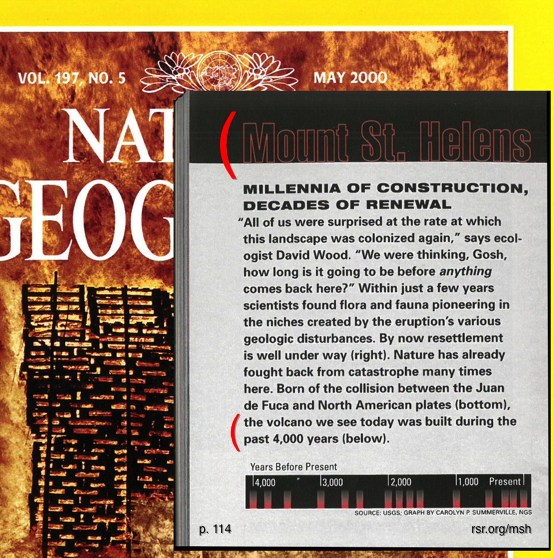 * Mount St. Helens Only 4000 Years Old: The May 2000 issue of National Geographic says about Mount St. Helens, "the volcano we see today was built during the past 4,000 years." Of course the editors of National Geographic believe that the Earth is billions of years old, and that every part of its surface, including under this volcano, has experienced tectonic activity for all that time. Nonetheless, it is interesting to note, and it fits in with the pattern of evidence in our not-so-old list above, that the evidence indicates that one of the largest active volcanos in the U.S. was formed in only about 4,000 years. (In even speedier Mexico, eyewitnesses saw the birth of their Paricutin volcano and already its "extinction".) Because old-earthers reflexively claim that most geologic features are hundreds of thousands or millions of years old, it is refreshing to see National Geographic acknowledge Mount St. Helen's youthfulness, so bluntly.
* Mount St. Helens Only 4000 Years Old: The May 2000 issue of National Geographic says about Mount St. Helens, "the volcano we see today was built during the past 4,000 years." Of course the editors of National Geographic believe that the Earth is billions of years old, and that every part of its surface, including under this volcano, has experienced tectonic activity for all that time. Nonetheless, it is interesting to note, and it fits in with the pattern of evidence in our not-so-old list above, that the evidence indicates that one of the largest active volcanos in the U.S. was formed in only about 4,000 years. (In even speedier Mexico, eyewitnesses saw the birth of their Paricutin volcano and already its "extinction".) Because old-earthers reflexively claim that most geologic features are hundreds of thousands or millions of years old, it is refreshing to see National Geographic acknowledge Mount St. Helen's youthfulness, so bluntly.
* Supervolcanoes Recharge Not in Millions, or Millennia, or 500 Years, but in Decades: A new (and scary) fast-charging supervolcano discovery made from studying tuft crystals in Yellowstone demonstrates that supervolcanos can recharge rapidly, in only decades (and, per RSR, probably faster than that).
MORE: From Creation magazine as discussed on RSR:
- Fossil wood from England dated at 25,000 years by carbon-14 embedded in allegedly 183-million year old limestone
- Diamonds from Botswana carbon-14 dated at 55,000 years old mined from rock dated 2 billion years old
- Mammal hair found in supposedly 100 million year old amber looks surprisingly "similar" to... modern hair
- Geologists say Uganda lava is just thousands of years ago but it's radioactively dated at 773 million years old
And separately, as microbial action forms opals rapidly, is there a similar function with cell membrane chemistry effecting the formation of Dolomite.
* The Widmanstätten Not-So-Old Wannabe: For the Widmanstätten pattern to be etched into iron requires a 700 degree celsius temperature but then said "to cool at one degree centigrade per million years" is a candidate for a future induction into RSR's Not So Old List. If you come across the replication of this pattern in iron, please forward your finding to Bob@rsr.org. Thanks!
See also Dr. Jonathan Sarfati's great article, How Old is the Earth? and RSR's very own youngearth.com!
* RSR's LIST Shows: We hope you enjoy our tradition of occasionally updating the great information in the following lists. The links are to the latest versions of these programs:
RSR's LIST Shows: We hope you enjoy our tradition of occasionally updating the great information in the following lists. The links are to the latest versions of these programs:
RSR's List of Not So Old Things
List of Evidence Against the Big Bang
List of Big Bang Predictions
List of Fine Tuning Evidence
List of Scholars Doubting Darwin
List of Creation Science Predictions
List of Shocked Evolutionists
List of Solar System Formation Problems
List of Papers that Shock Potheads
List of Carbon 14 Everywhere it Shouldn't Be
List of Dinosaur Soft Tissue Journal Papers
List of Answers to Hydroplate Objections
List of Proofs for the Genius of Ancient Man
List of Missing Transitional Fossils
List of Genomes that Just Don't Fit
List of Fresh Fossils
List of Solar System Transient Events
List of Creationist Fathers of Science
List of Whale Evolution Problems
Today's Resource: Have you browsed through our Science Department in the KGOV Store? You just might love the resources and you can consider giving as a gift a DVD or Blu-ray of our latest science video which falsifies the Big Bang theory and thus, the widely claimed evidence for its age:

